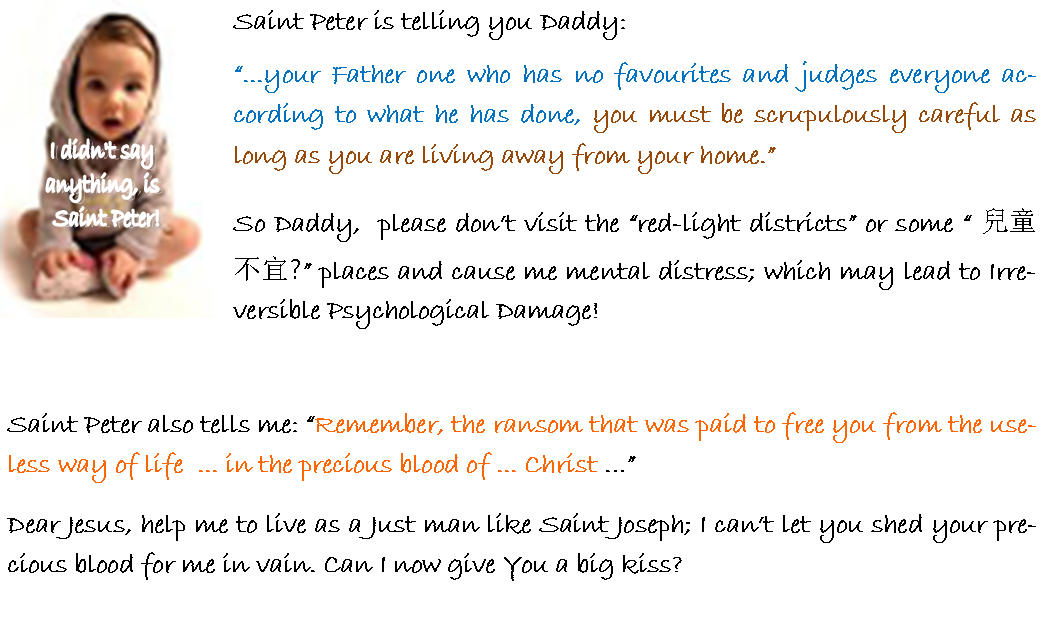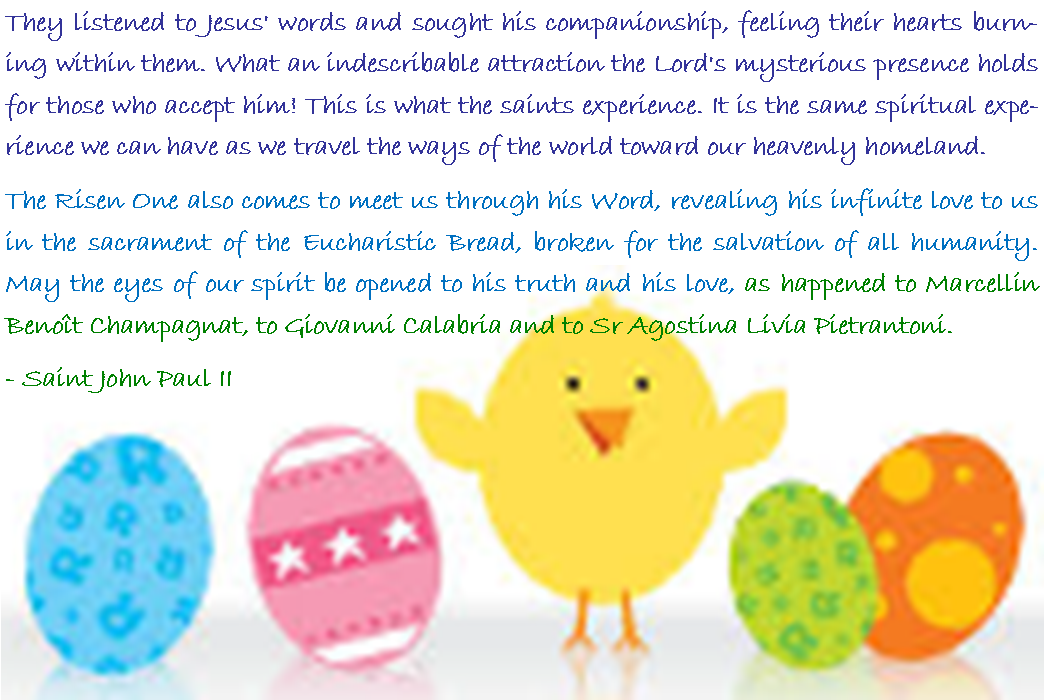|
164 |

|
Third Sunday of Easter, Responsorial Psalm: Psalm 16:1-2, 5, 7-11 Show us, Lord, the path of life. or Alleluia!
Preserve me, God, I take refuge in you. I say to the Lord: ‘You are my God. O Lord, it is you who are my portion and cup; it is you yourself who are my prize.’
I will bless the Lord who gives me counsel, who even at night directs my heart. I keep the Lord ever in my sight: since he is at my right hand, I shall stand firm.
And so my heart rejoices, my soul is glad; even my body shall rest in safety. For you will not leave my soul among the dead, nor let your beloved know decay.
You will show me the path of life, the fullness of joy in your presence, at your right hand happiness for ever. |

|
Third Sunday of Easter, Second Reading: first letter of Saint Peter 1 Peter 1:17-21 If you are acknowledging as your Father one who has no favourites and judges everyone according to what he has done, you must be scrupulously careful as long as you are living away from your home. Remember, the ransom that was paid to free you from the useless way of life your ancestors handed down was not paid in anything corruptible, neither in silver nor gold, but in the precious blood of a lamb without spot or stain, namely Christ; who, though known since before the world was made, has been revealed only in our time, the end of the ages, for your sake. Through him you now have faith in God, who raised him from the dead and gave him glory for that very reason – so that you would have faith and hope in God.
Gospel Acclamation cf.Luke24:32 Alleluia, alleluia! Lord Jesus, explain the Scriptures to us. Make our hearts burn within us as you talk to us. Alleluia! |


|
Third Sunday of Easter, Gospel Reading: holy Gospel according to Luke 24:13-35 (This happened on Easter Sunday) Two of the disciples of Jesus were on their way to a village called Emmaus, seven miles from Jerusalem, and they were talking together about all that had happened. Now as they talked this over, Jesus himself came up and walked by their side; but something prevented them from recognising him. He said to them, ‘What matters are you discussing as you walk along?’ They stopped short, their faces downcast. Then one of them, called Cleopas, answered him, ‘You must be the only person staying in Jerusalem who does not know the things that have been happening there these last few days.’ ‘What things?’ he asked. ‘All about Jesus of Nazareth’ they answered ‘who proved he was a great prophet by the things he said and did in the sight of God and of the whole people; and how our chief priests and our leaders handed him over to be sentenced to death, and had him crucified. Our own hope had been that he would be the one to set Israel free. And this is not all: two whole days have gone by since it all happened; and some women from our group have astounded us: they went to the tomb in the early morning, and when they did not find the body, they came back to tell us they had seen a vision of angels who declared he was alive. Some of our friends went to the tomb and found everything exactly as the women had reported, but of him they saw nothing.’ Then he said to them, ‘You foolish men! So slow to believe the full message of the prophets! Was it not ordained that the Christ should suffer and so enter into his glory?’ Then, starting with Moses and going through all the prophets, he explained to them the passages throughout the scriptures that were about himself. When they drew near to the village to which they were going, he made as if to go on; but they pressed him to stay with them. ‘It is nearly evening’ they said ‘and the day is almost over.’ So he went in to stay with them. Now while he was with them at table, he took the bread and said the blessing; then he broke it and handed it to them. And their eyes were opened and they recognised him; but he had vanished from their sight. Then they said to each other, ‘Did not our hearts burn within us as he talked to us on the road and explained the scriptures to us?’ They set out that instant and returned to Jerusalem. There they found the Eleven assembled together with their companions, who said to them, ‘Yes, it is true. The Lord has risen and has appeared to Simon.’ Then they told their story of what had happened on the road and how they had recognised him at the breaking of bread.
Sharing:
It was the Third Sunday of Easter on 4 May 2014.
The Readings that were read in the Eucharistic Celebrations all over the world on the same day are shown in previous page & above:
First Reading: Acts of the Apostles 2:14, 22-33, Responsorial Psalm: Psalm 16:1-2, 5, 7-11, Second Reading: 1 Peter 1:17-21 & Gospel Reading: Luke 24:13-35 .
We have extracted the Homilies of Saint John Paul II, Pope Benedict XVI & Pope Francis I based on the aforesaid Readings to share with you, so that you could similarly be encouraged: |

|
CANONIZATION OF FR MARCELLIN CHAMPAGNAT, HOMILY OF JOHN PAUL II Sunday, 18 April 1999
1. "He took the bread and blessed, and broke it, and gave it to them. And their eyes were opened and they recognized him" (Luke 24:30-31).
We have just heard again these words of Luke's Gospel: they tell of Jesus' meeting with two disciples who were on their way to the village of Emmaus, the very day of the Resurrection. This unexpected meeting brings joy to the hearts of the two discouraged travellers and rekindles their hope. The Gospel says that when they recognized him, they left "that same hour and returned to Jerusalem" (Luke 24:33). They felt the need to tell the Apostles about "what had happened on the road, and how he was known to them in the breaking of the bread" (Luke 24:35).
The desire to bear witness to Jesus arises in the hearts of believers from their personal encounter with him. This is what happened with the three new saints whom today I have the joy of raising to the glory of the altars: Marcellin Benoît Champagnat, Giovanni Calabria and Agostina Livia Pietrantoni. They opened their eyes to the signs of Christ's presence: they adored him and received him in the Eucharist; they loved him in their neediest brethren; they recognized the signs of his saving plan in the events of daily life.
They listened to Jesus' words and sought his companionship, feeling their hearts burning within them. What an indescribable attraction the Lord's mysterious presence holds for those who accept him! This is what the saints experience. It is the same spiritual experience we can have as we travel the ways of the world toward our heavenly homeland. The Risen One also comes to meet us through his Word, revealing his infinite love to us in the sacrament of the Eucharistic Bread, broken for the salvation of all humanity. May the eyes of our spirit be opened to his truth and his love, as happened to Marcellin Benoît Champagnat, to Giovanni Calabria and to Sr Agostina Livia Pietrantoni.
2. "Did not our hearts burn within us while he opened to us the Scriptures?". The burning desire for God in the disciples of Emmaus was vividly felt by Marcellin Champagnat, who was a priest captivated by the love of Jesus and Mary. Because of his unshakeable faith, he remained faithful to Christ despite difficulties, in the midst of a world sometimes lacking the sense of God. We too are called to draw strength from contemplation of the risen Christ by learning at the school of the Virgin Mary.
St Marcellin proclaimed the Gospel with a burning heart. He was sensitive to the spiritual and educational needs of his time, especially to religious ignorance and the situations of neglect experienced in a particular way by the young. His pastoral sense is an example for priests: called to proclaim the Good News, they must also be true teachers for young people who seek to give meaning to their lives, by accompanying each of them on their way and explaining the Scriptures to them. Fr Champagnat was also a model for parents and teachers, helping them to look with hope at young people, to love them with a total love which fosters their true human, moral and spiritual formation.
Marcellin Champagnat also invites us to be missionaries, to make Jesus Christ known and loved as the Marist Brothers did even in Asia and Oceania. With Mary as our guide and Mother, the Christian is a missionary and the servant of human beings. Let us ask the Lord to give us a heart that burns like that of Marcellin Champagnat, to recognize him and to be his witnesses.
3. "This Jesus God raised up, and of that we all are witnesses" (Acts 2:32).
"We are all witnesses": the one speaking is Peter, in the name of the Apostles. In his voice we recognize those of countless other disciples who down the ages have made their life a witness to the Lord who died and rose again. The saints canonized today join this chorus. Fr Giovanni Calabria joins it, an exemplary witness to the Resurrection. He is resplendent for his fervent faith, genuine charity, spirit of sacrifice, love of the truth, zeal for souls and fidelity to the Church.
In the year dedicated to God the Father which leads us into the Great Jubilee of the Year 2000, we are invited to put great emphasis on the virtue of charity. Giovanni Calabria's entire life was a living Gospel, overflowing with love: love for God and for his brothers and sisters, especially the very poor. The source of his love of neighbour was his boundless faith and his filial abandonment to the heavenly Father. He loved to repeat to his co-workers these words of the Gospel: "Seek first his kingdom and his righteousness, and all these things shall be yours as well" (Matthew 6:33).
4. The Gospel ideal of the love of neighbour, especially towards the lowly, the sick and the abandoned, also led Agostina Livia Pietrantoni to the peak of holiness. Formed in the school of St Joan Antida Thouret, Sr Agostina realized that the love of Jesus calls for generous service to one's brothers and sisters, for it is in their faces, especially those of the neediest, that the face of Christ shines. "God alone" was the "compass" that guided all the decisions of her life. "You shall love", the first and fundamental commandment put at the beginning of the "Rule of Life of the Sisters of Charity", was the inspiration for the new saint's works of solidarity, the inner stimulus which sustained her in her self-giving to others.
Continue next page ...
11 May 2014
|